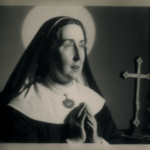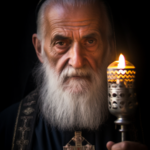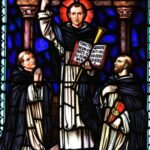
St. Frederick
St. Frederick
When He Lived
St. Frederick of Utrecht lived from circa 780 to 18 July 838.
Where He Lived
He lived in what is now known as the Netherlands, specifically in Utrecht. He was also known to have spent time in other areas within the Holy Roman Empire, given his position within the church.
Notable World Events During His Life
- Charlemagne’s Reign (768–814): Charlemagne was King of the Franks and Lombards and later became the first Holy Roman Emperor. His reign significantly influenced the course of European history.
- The Viking Age (793–1066): The Viking Age was marked by the extensive seafaring, trading, and raiding of the Norse people. The first Viking raid on England occurred at the monastery of Lindisfarne in 793.
- The Iconoclasm Controversy (8th-9th Century): This religious conflict within the Byzantine Empire, centered around the use of religious images or icons, had significant effects on the Eastern Orthodox Church.
- The Carolingian Renaissance (Late 8th and 9th Centuries): During this period, there was a revival of learning and culture in the Carolingian Empire, influenced by Charlemagne’s desire to improve education and literacy.
- The Abbasid Caliphate (750-1258): This was the third caliphate, marked by a golden age of Islamic culture that influenced fields such as philosophy, science, and medicine.
His Patronage
St. Frederick of Utrecht is the patron saint against deafness. He is also invoked against ear diseases, fever, and sudden death. His life of piety and dedication to his pastoral duties have been a source of inspiration for many.
St. Frederick (born c. 780 AD, died 838 AD) was a bishop of Utrecht who hails from Friesland. He was the grandson of the Frisian king Radboud.
He preached at St.Oduluf and Walcheren in Stavoren and also in its surrounding areas. He was chosen as the next bishop of Utrecht after the death of Refried.
He was known for his vast knowledge, intellect, and piety. The biography of Vita S. Bonifacio has been attributed to him.
Religious and Political contributions
He was tutored by clergymen from an early age, including Ricfried, who was bishop of Utrecht. He was instructed in devotion and consecrated learning with the clergy of the Utrecht church. He was appointed as a priest as soon as he completed his studies.
He was chosen to be the successor of Bishop Ricfried about 825 as Bishop of Utrecht, and by him, He was charged with turning the residual paganism in the bishopric’s northern territories and places beyond the diocese.
Considering his mark and name, he got himself involved in political matters. The empress Judith was charged by the young prince with various immoralities. It is said that Frederick admonished her for them. He spoke to her with charity and patience, but he drew upon himself resentment of the empress.
Fredrick also found himself raising the fury of those who did not adhere to Christian beliefs and spreading Christian teachings throughout the land. He was intensely disliked by many individuals who were in power and were dangerous. However, he refused to bow down.
He was most disliked by the natives of Walcheren, as they were uncivilized and against the gospel. He led priests to the diocese’s northern reaches, claiming this dangerous and challenging territory for himself.
He was greatly troubled by marriages contracted within the separation of parties and the forbidden decree in those areas. As the Walcheren were hostile towards Christian teachings.

The Uncertain Death of St. Frederick
It is vague how exactly Frederick died, but he was undoubtedly murdered. He was making his Thanksgiving. As he completed his mass celebration.
Two assassins stabbed him on July 18, 838. His final words were, I will praise the Lord in the land of the living.”
However, It is also unclear who ordered the assassins. But the historians or the authors who wrote about him agree that it was because of his preaching and enforcement of Christian beliefs. The church considers him a holy martyr who gave his life to devotion.
Eleventh- or twelfth-century writers claim that assassins were hired by the empress Judith, as she was sick of daily admonishment by St. Frederick and could not lenience her liberty being seized away.
Willia of Malmesbury and Obert of Liege claim the same thing, while later writers like Jean Mabillion and Cesare Baronio believe the assassin was dispatched by Walcheren because they were anti-Christian. They send them as their response to his teaching and his beeriness.
The latter one seems more reasonable. There are no sources found for the writer saying that the empress was immoral or shameless, and moreover, it is found that Walcheren stayed antagonistic towards the priests in Utrecht.
He was buried at St. Salvator’s Church in Utrecht. The 18th of July is his feast day.
5 Interesting Facts About St. Frederick
- He is revered as the patron saint of deaf people.
- He is known for his erudition and piety.
- He composed a prayer to the Blessed Trinity. It was used in the
Netherlands for many ages. - Hagiography Vita S. Bonifacio has been attributed to him.
- St. Fredrick often used the saying, “Use words when necessary.”
Prayer to St. Frederick
God, You gave splendor to Your Church by granting St. Frederick the victory of martyrdom. Grant that, as he imitated the Lord’s Passion, we may follow in his footsteps and attain everlasting joys. Amen.



